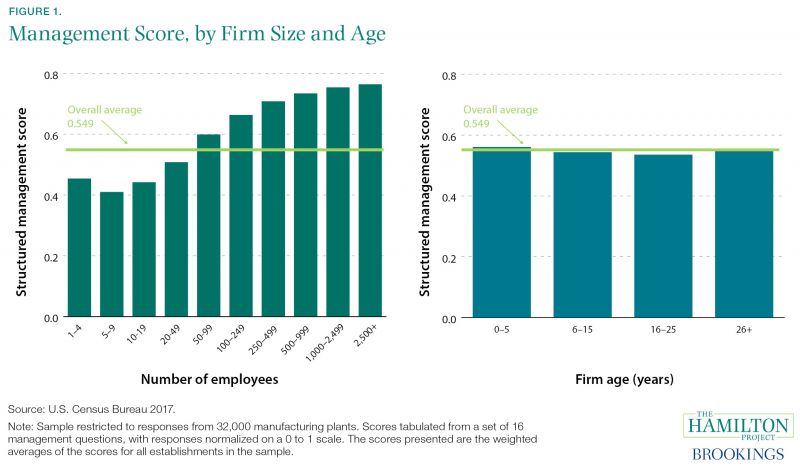As many employees or customers can attest, not every business is managed well. Recent research suggests that certain management practices make it more likely a business can thrive, but analysis of new survey data suggests many small firms do not follow the best management practices. Given the declining rate of startups and their importance to the economy, it is important to make sure potential fast growth firms learn good management practices.
The Management and Organizational Practices Survey (MOPS) was conducted by the U.S. Census Bureau in 2015 to allow analysis of structured management practices and related economic outcomes. Establishments were asked a series of questions about their management practices. The resulting “management score” reflects the extent to which firms track performance indicators, promote employees based on performance, and implement other management practices.
The management score is important because understanding the quality of entrepreneurship is just as important as understanding its quantity. While much of what allows a startup to succeed is opaque to researchers, a developing body of research has explored the significance of management practices.
These management scores are correlated with positive firm outcomes; for example, a 10 percent increase in management score corresponds to a 5 to 14 percent increase in labor productivity.
Our analysis of MOPS data shows that:
- Firm age is not associated with quality of management. Though differences in management quality predict short-run firm growth and survival, average management competence does not increase with age;
- Small firms often lack the management skills necessary to help their firms grow.
The figure below depicts the profile of an average management score with respect to firm size (left panel) and firm age (right panel). As one might expect, the management score improves substantially as the number of employees increases. Large firms became large in part because they possessed superior management techniques, and perhaps in part because expansion necessitated an improvement in management. This account is complicated, however, by the fact that 40 percent of management score variation exists within multi-establishment firms, with some establishments deploying much more effective practices than others.

While many entrepreneurs do not aim to create a large business, those who do are critical to economic growth. New firms introduce new products, challenge incumbents to improve, and improve labor productivity when new productive firms hire workers away from existing less productive firms. But analysis shows that business dynamism in the United States has been falling for decades. In fact, startups as a fraction of all firms have fallen from 14 percent in 1979 to 8 percent in 2014, a decline that occurred in every major industry. Young firms now employ only 19 percent of all workers, well below the 33 percent they employed thirty years ago. New firms are more likely to make substantial economic contributions when they are equipped with the resources they need to succeed, and research suggests training in management practices may be a crucial boost.
In response, a new evidenced-based policy solution aimed at strengthening entrepreneurship throughout the U.S. can be found in a recent Hamilton Project proposal by Aaron Chatterji (Duke Fuqua School of Business). Specifically, the proposal offers a blueprint for the creation of the “Main Street Fund,” which would limit the preferential state and local tax treatment accorded to established incumbent firms. The proposal calls on states to support startups through investments that promote entrepreneurship and a competitive economy, such as management training.
Grounded in research showing the positive effects of specific management practices for business success—and for overall economic productivity—these investments would help entrepreneurs to scale up their activities. Chatterji includes provisions for ongoing rigorous evaluation of the management training initiatives, which would allow states to find the most effective means of supporting startups. It is imperative that new and innovative policy solutions, such as Chatterji’s Main Street Fund, are implemented to strengthen U.S. entrepreneurship and the conditions that support it.



